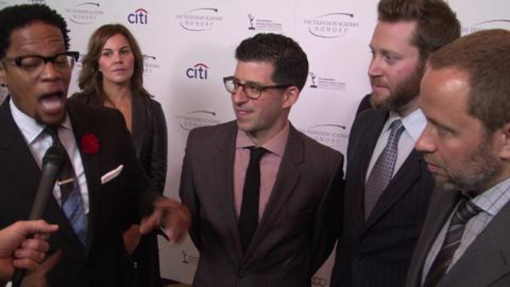Few cult shows have left such a distinct pop-culture footprint as Strangers with Candy.
Created in 1999 by Amy Sedaris, Paul Dinello, Mitch Rouse and Stephen Colbert, Strangers with Candy was Comedy Central's first live-action sitcom and proved to be a key milestone in the then-fledgling cable network's development. The show centers on Sedaris's Jerri Blank — a former prostitute and recovering addict (or, to use the show's parlance, a "junkie whore") — who, in her 40s, decides to go back and finish high school. Tonally, the series is an acerbic, satirical take on the ABC Afterschool Special. Joining Sedaris onscreen were co-creators Colbert and Dinello as teachers having a secret love affair who always seemed to get caught up in Jerri's considerable hijinks. Despite its three-season run, Strangers found a loyal fan base on its way to cult-hit status.
In honor of the series premiere, which aired 25 years ago this week on April 9, 1999, we spoke with Sedaris and Dinello on how they developed their pitch, which gags the network wouldn't allow on air and the duo's (nonexistent) anniversary plans.
Television Academy: How did the two of you, working with Colbert and Rouse, initially develop this idea?
Amy Sedaris: I went to Paul and Steven with an idea to do Afterschool Specials. Just do them. Colbert had the idea to always learn the wrong lesson, and Paul had the idea for it to be the Jerri Blank-type character — someone older.
Paul Dinello: I had watched a documentary about a woman who was a motivational speaker about her time as a prostitute and a drug addict, and she was trying to scare high school kids straight. She was about four-foot-eight and in her 50s, but still kind of hip. Anyway, I watched it, and I called Amy and said, "You should do this as a character. It's perfect for you." We just combined all those things together.
I read a long time ago that Paul and Colbert had a different idea for a show that Comedy Central loved. But then, Paul, you suggested that you and Colbert team up with Amy on Strangers, but Colbert was reluctant to do that. Do you remember why?
Dinello: That's true. Stephen and I were at work on something called Incredible Mysteries of the Unknown, or something like that. It wasn't that fleshed out, but we would try to uncover the mystery of things like the pyramids as an alien landing strip. That was essentially the idea, but with jokes.
Sedaris: Boooooring.
Dinello: Comedy Central was set to pick it up. Then Amy said, "Can we go pitch the Strangers with Candy thing we put together first?" But yes, Colbert said [something like], "If we go pitch this, we'll never do our show." Sure enough, they never mentioned it again.
How much research did you have to do to nail that specific tone?
Sedaris: We all watched every Afterschool Special there was. We would rent the film strips. Remember, Paul, when we'd rent the 16mm prints?
Dinello: A lot of the stuff wasn't on video, so the only way we could watch it was we had to rent a 16mm projector to see them.
Sedaris: One thing we found that was interesting when we were watching them is that the father was pretty much nonexistent. Like, if there was an issue happening, the father's on the couch with his back to the camera. He was useless. Stephen had the idea of taking it a step further and having my dad frozen. I thought that was pretty funny.
How did you get away with all the jokes and gags that you'd think, in hindsight, the network would never let you get away with back then?
Sedaris: We didn't know what we were doing. We were in the woods making each other laugh, but we didn't know the rules of TV. So we just did things until we were told we couldn't do it. Just kind of making it up as we went along.
Dinello: Also, Kent Alterman, our executive at the network, gave us a lot of freedom. He had a good creative mind, but he was also a good buffer between us and the network. He protected us and said, "Just do what you guys are going to do." Somehow, he got it to fly at the network. I don't know how, because they always seemed upset about the stuff we were doing.
Can you give me an example of that?
Dinello: One thing, obviously, was that Jerri was an antisemite. She would insult her diary as if it was a living entity. She called it a "dirty, dirty Jew diary," and the network said we couldn't say "dirty" twice.
Sedaris: We changed the second "dirty" to "filthy."
Dinello: And we couldn't say the phrase "albino midget." I don't remember what we changed it to, but [notes like that] all seemed pretty arbitrary.
There are few characters in TV history that are both standoffish and magnetic as Jerri. How did you approach creating this character?
Sedaris: Well, I had the look — that facial expression. I then told my hair and makeup people that I wanted to look like a professional golfer. Then we added the fake eyelashes and everything. But Paul and Steve were really good about writing for her, keeping her innocence.
Dinello: We always thought of her as a feral animal. She wasn't quite responsible for the things she said or did — it was just part of her DNA. She wanted to do the right thing, but she was just a horrible human who was incapable of learning.
I find that when you're talking to someone and they mention they're a Strangers with Candy fan, it instantly gives them some credibility.
Dinello: I met RuPaul. I work with Stephen on Late Show, but RuPaul was on and wanted to meet me, because he was a fan of Strangers. I'm always flattered, but I have no idea where it sits culturally. For those three years we worked on it, we really had no concept of whether people liked it, or if anyone even watched it. But it's always nice that people point to it.
Sedaris: The kids who are 36, 37, they grew up watching Strangers with Candy. I like talking to them about it, because they'd never seen anything like it. That's how I felt growing up with SCTV. So that's kind of cool. Making the show did seem a little bit like the Wild West. Comedy Central never really canceled us. We still haven't been canceled. Kent was in charge of the East Coast Comedy Central, and there was a woman that was in charge of West Coast, and his show baby was Strangers and hers was Strip Mall. The head of Comedy Central was leaving, and they were going to move one of those people up, and we knew they wanted to cancel one of the two. Anyway, she got moved up and Kent ended up leaving Comedy Central, so we knew the writing was on the wall. We were like, "Are we canceled?" And Comedy Central goes, "Wait, what? We don't know what you're talking about." But we were like, "It's fine. We just want to do a last show." So that inspired us to turn the school into a strip mall, but the conceit was no one at the school would really be aware that it was happening. It was satire in real time, writing about our situation.
Since this is the show's 25th anniversary, any plans to get together with Colbert? Maybe on his show?
Sedaris: It's a good idea. I never thought about Colbert's show. I think it'd be fun to do.
Dinello: The three of us talk about doing something, but we haven't yet. Everybody seems game to do something. But we need an adult to make it happen.
This interview has been edited for length and clarity.
Strangers with Candy is streaming now on Paramount+.











